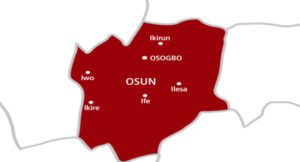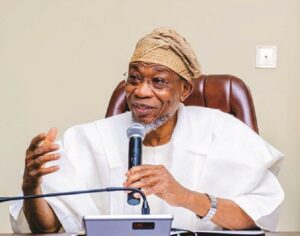


Osun 47bn first phase infra plan: How Governor Adeleke’s Govt allocated N23bn on a single road in Ede
By Waheed Adekunle
Following the release of whooping sum of N47billion recently approved by Governor Ademola Adeleke of Osun State for some of the ongoing roads projects in the state, it has been conscientiously observed and conspicuously noticed that nothing less than N23 billion naira was deliberately skewed to dualise a single road in Ede.
This humongous fund was purposely earmarked to further isolate the Governor’s country home through deliberate effort to complement many roads that had been constructed, rehabilitated and reconstructed within Ede axis at the detriment of the other parts of Osun, since the inception of Governor Adeleke.
Recall that the state government had a few days ago released the financial implications of some of the roads already embarked on, after incurring several bashings from the general public particularly members of the opposition party.
The state chapter of the All Progressives Congress (APC) had since last year, continued to advocate transparency and accountability in the management of the public funds, calling out Adeleke’s government to make public the costs of the approved contracts and unveil the identity of contractors handling many of the public infrastructure projects in the State.
But in its belated response to the clamour, which though appeared very suspicious and ambiguous, the Commissioner for Information and Public Enlightenment, Kolapo Alimi, was quoted to have said Governor Adeleke approved over N23 billion for the construction of Akoda to Oke-Gada road in Ede. A road that is less than 12km.
According to the statement, N12,200,512,000 was approved for the dualisation of 5.50km Akoda to Baptist High School road and N11,090,838,764 for the dualisation of 3.86km Baptist High School to Oke Gada road, both in Ede, totaling N23,291,350,764.
It was however, conspicuously noticed that the less than 12km dual carriageway was unnecessarily divided into two segments for no just cause, as each of the segments was given to different contractors, for the reasons best known to the government. It is equally on record that the award of the same road which started last year was severely criticised by the opposition party for not following the due process and in accordance with the Osun 2015 Procurement Law.
In a saner clime, if not for personal gratification, awarding 12km intra-city road to two companies is nothing but a charade as such could only encourage corruption, nepotism and poor service delivery.
It is no long news that the resurface, regurgitation and promotion of ‘Edenisation agenda’ started from the draconian Executive Order made by Governor Ademola Adeleke right from the spot where he was being sworn-in as the Governor. The Executive Order that had ruined the lives of many people such as (over 20,000 OYES volunteers that were arbitrarily sacked; many health workers that were callously ordered home; school teachers that were sent packing and rendered jobless; O’meal vendors that were cruelly sacked among others). These are the people whose sources of livelihood had been hampered and future mortgaged in the hands of tyrannic policies that had yielded no positive impact or provided commensurable replacements thus far. No doubt the “Order” was considered as an instrument of reprisal skillfully crafted and widely enunciated to subdue perceived enemies and score cheap political points.
Taking cognisance of the fact that, Osun is one of the few states in the country with major cities and towns, the approval of over N23 billion out of N47 billion plus acclaimed ‘first phase infra project’ to execute a single road in Ede at the expense of other cities and towns in the state, has further validated the Edenisation agenda of Adeleke’s government.
It is far from rational thinking that in spite of inherent nepotism and clannishness that characterised the administration, the Adeleke’s government could still allocate humongous funds to execute just a single road in Ede at the expense of many deplorable roads that had become death traps in many villages, towns and cities in the state.
A visit to Ede would definitely expose one to and give a clear picture of many intra-town network of roads that the current government had used the people’s commonwealth to rehabilitate or reconstruct in the Governor’s country-home in the last 15 months. Some of the roads that had been constructed and completed so far in Ede under Governor Ademola Adeleke’s government are: total filling station to Alusekere through Muslim Grammar School to Owode-Ede road; Akankan to Prof. Oyeweso road; Anuolu junction through Obada to Alusekere road; Akankan to Agate road; Orita Alajue junction to Elerin road; Orita Oloki to Ogberin road; Orita Oloki to Orita Oja-Timi road; Oja-Timi to Isale-Apaso road; Okunola Okunade Sawmill to NYSC Camp road; Isibo through Muslim Grammar School to Orita Muslim Cemetery road; Ibiyemi to Sawmill Oke- Gada road; Manyasahu filling station to Hamaddiyah road.
Aside from the aforementioned roads (all in Ede) that had been completed by Adeleke’s government, there are many other ongoing networks of roads in Ede which include Orita Agate to Olorin among others.
Some of the raging questions agitating minds are; if former Governors and governments had used the state resources parochially to solely advance the cause of their towns particularly in infrastructural development while serving the state, would it be possible to have some of the physical infrastructural development we have today in most of the villages, towns and cities? How life would have been for other towns in Osun if for instance, former Governor Adebisi Akande (from Ila-Orangun) whose tenure opened up Osun to socioeconomic renaissance and infrastructural rejuvenation concentrated all or larger chunks of the infrastructural development to his country-home? Ditto others. This is a food for thought!
Chief Abdul-Kareem Adebisi Akande was once a governor, he didn’t ‘ILANISE’ Osun but rather ensured even, fair and equitable distribution of resources across the state under his watch, ditto former Governors Olagunsoye Oyinlola (from Okuku); Ogbeni Rauf Aregbesola (from Ilesa) and Mr. Adegboyega Oyetola (from Iragbiji).
As painful as the scenario of nepotism, chauvinism and flagrant disobedience to the fundamental principles of fairness, equity and rule of law which are the hallmarks of the current government, it is crystal clear that history beckons on all either positively or negatively. Many have governed Osun and they have written their names in the golden pages of history for generations to come, thus, the current government should know that people are copiously taking record of everything that is happening under it for posterity sake.
May God heal our land!



